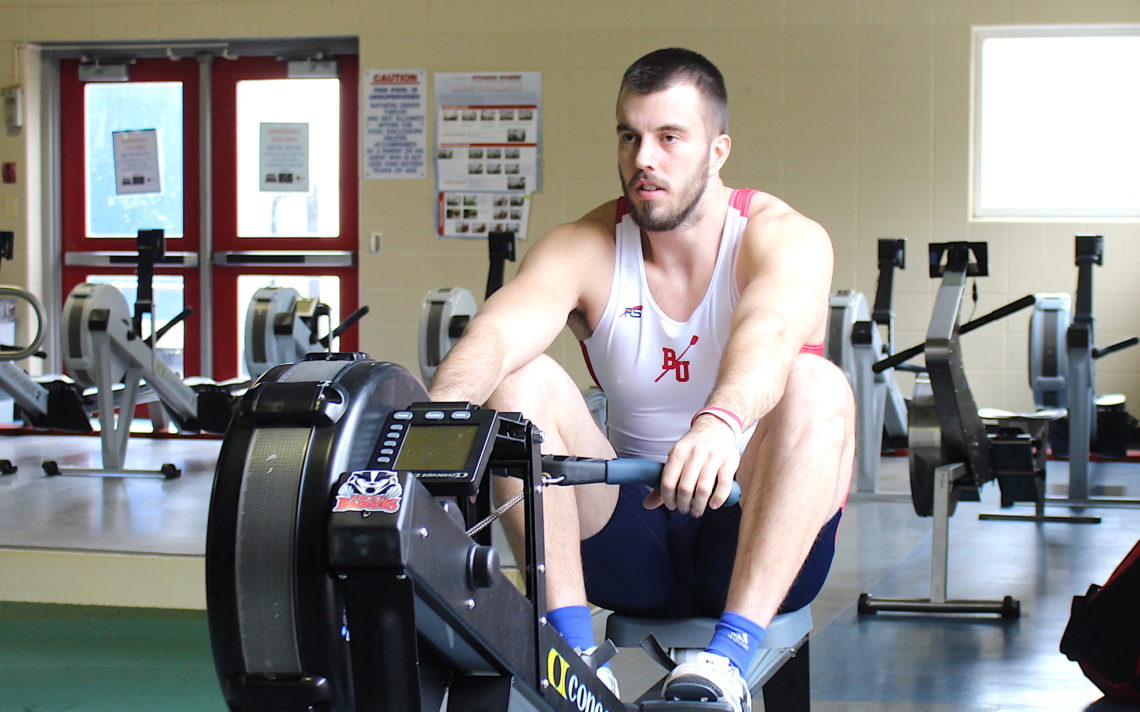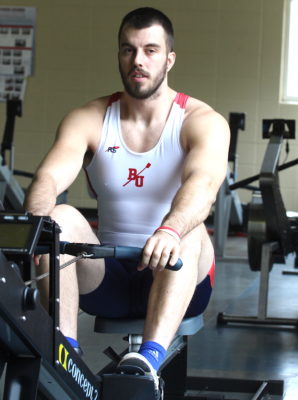
Rower envisions spot on national team
James Kwinecki thought he had his life mapped out.
The 24-year-old St. Catharines resident had a great job working at the Ford plant in Oakville and then life threw him a curveball. At age 21, he began to lose his vision because of a rare disease called Leber’s hereditary optic neuropathy.
“It was out of the blue,” said the former Governor Simcoe Redcoats basketball player. “It was six to eight months of testing to see if I had a brain tumour or something else.”
Finally, the doctors figured it out and Kwinecki had to get used to a new reality.
 “I am at five per cent vision now and it’s not going to get any worse. It took about 10 months for it to stabilize to where it is now.”
“I am at five per cent vision now and it’s not going to get any worse. It took about 10 months for it to stabilize to where it is now.”
He can see shapes, light and contrast.
“It’s mostly just black and white and I have pretty good spacial awareness, but in the centre, it is a lot of blurry pixels. It’s like static from a TV in the centre.”
After the initial feelings of why me? Kwinecki started to get on with his life.
“It was a long, drawn-out process of not really knowing what to do next, especially considering I thought I would be working at Ford for the rest of my life,” he said. “It took me a while, but then I got to meet other people who are visually impaired and then I started to play different adaptive sports.”
He also met others on Facebook who were afflicted with the same disease.
“They told me everything was going to be alright, but that it just takes some time,” he said. “Finding ways to stay busy was the biggest thing for me.”
He tried his hand at blind baseball in Toronto for one summer and met a number of Paralympians who urged him to find a parasport to pursue. He then tried tandem cycling before eventually coming into contact with Brock rowing coaches Peter Somerwil and Swede Burak.
“Once I got into the parasports, rowing was the perfect outlet because it takes up a lot of your time. It worked out pretty well because I had nothing but time on my hands,” he said. “And I really enjoyed pushing myself and my body to its limits. Finding a comfort level on the water was nice too.”
 Kwinecki started rowing in January of 2018 and agrees it wasn’t totally love at first sight.
Kwinecki started rowing in January of 2018 and agrees it wasn’t totally love at first sight.
“I definitely loved parts of it, but then I questioned lots of parts of it as well,” the 6-foot-4, 220-pounder said. “Am I really going to be open to doing this and am I OK with waking up this early?
“But everything started falling in the right places, the opportunities kept on showing up and I keep on progressing.”
That progress has been encouraging.
“That’s the best part of being in a sport. In rowing, you are always learning and getting better and that’s one of my favourite parts about the sport.”
In the summer, he spent a lot of time on the water in a single shell working with Burak.
“Swede definitely helped me out and he’s one of the main reasons I want to continue to row,” he said.
Kwinecki was identified as a development athlete for Rowing Canada’s para team and attended a training camp in Victoria, B.C., last August.
“It was just to see what I could do and get in the mix of things because I think I could be a viable option for one of their boats and hopefully compete this summer, depending on where it is and who it is with.”
 Kwinecki enrolled at Brock in the fall of 2018 and earned a seat in Brock’s junior varsity four. The boat won the Head of the Trent and placed third at the Ontario University Athletics championships.
Kwinecki enrolled at Brock in the fall of 2018 and earned a seat in Brock’s junior varsity four. The boat won the Head of the Trent and placed third at the Ontario University Athletics championships.
“James is very athletic and determined and he has done a lot,” Somerwil said. “I think he is an inspiration to the team and the team has responded really well by helping him. He also helped them because they realize if he can do it, they can do it.”
The main focus for Brock’s coaches now is working with Kwinecki on the technical aspect of rowing.
“It presents some challenges because you can’t show him a model of what it should look like,” Somerwil said. “It’s interesting from a coach’s perspective because you have to rethink how you coach.”
That being said, Kwinecki has several inherent advantages.
“He has the long levers and all the previous weight training has given him as much or more strength than he needs which is really great,” Somerwil said. “He has worked hard at building his aerobic fitness over the last year and combining that with his strength is allowing him to set these world records.”
Six ergometer world record to be precise in the age 19-49 pararow three category. His records include: rowing 16, 273 metres in 60 minutes, travelling a 6,000-metre distance in 21 minutes and 14.3 seconds, and a completing a 2,000-metre course in a time of 6:20.4.
“I take a lot of pride in the 2k because that has been my focus,” he said. “I hope I can continue to keep getting faster and keep breaking my own world records.”
His other records aren’t too shabby either.
“The hour test is really cool because I would never have expected to have that world record,” Kwinecki said. “It was really nice to know that I was able to do that and it opened my eyes to all the other world records I could start to attack.”
He’s zealous with that attack.
“You can always push yourself more and more, especially on the erg,” Kwinecki said. “You get kind of addicted to watching the numbers go down, but you realize it’s never going to get easier. It just gets harder and harder, the faster you get.”
He attended another Rowing Canada training camp during Brock’s reading week and is hoping to land a berth in a boat for the 2019 world championships. He would ultimately love to earn a spot in Canada’s leg, trunk and arms mixed coxed four.
“The end goal is to definitely get in that mixed four one day whether it’s Tokyo (2020 Paralympics) or Paris in 2024,” he said. “Obviously the sooner the better, but I am taking it one step at a time. I am working to be at the top of my game.”
It is a labour of love.
“I am really start to enjoy that feeling on the water when you get the boat moving and that is getting the competitive fire back in me again.”

























